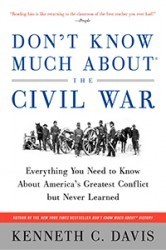Kenneth C. Davis's Blog, page 87
June 24, 2014
Whatever Became Of…56 Signers? (2d in a series)
…We mutually pledge to each other our Lives, our Fortunes , and our Sacred Honor.
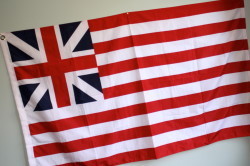
The Grand Flag of the Union, first raised in 1775 and by George Washington in early 1776 in Boston. The Stars and Stripes did not become the “American flag” until June 14, 1777. (Author photo © Kenneth C. Davis)
Here are the next five Signers of the Declaration, continuing in alphabetical order:
-Samuel Chase (Maryland) A 35 year old attorney, Chase has the distinction of being among those signers who didn’t vote on July 4; he signed the later printed version in August. Accused of wartime profiteering but never tried or convicted, he later went broke from speculation and settled into law practice. George Washington appointed him to the Supreme Court, where the became the first justice to be impeached –although he wa acquitted. He died in 1811 at age 70.
-Abraham Clark (New Jersey) An attorney, 50 years old at the signing, Clark had two sons who were captured and imprisoned during the war; one on on the notorious British prison ship Jersey and the other in a New York jail cell. Clark served in Congress on and off and opposed the Constitution’s ratification until the Bill of Rights was added. He died in 1794 at age 68.
-George Clymer (Pennsylvania) A 37 year old merchant the time of the signing, Clymer was a well-heeled patriot leader who helped fund the American war effort. He was also elected to Congress after the July 2 independence vote, signing the Declaration on August 2. He belongs to an elite group who signed both the Declaration and the Constitution. (The others were Roger Sherman of Conn,; George Read of Del.; and Franklin, Robert Morris and James Wilson, all of PA.) He continued to prosper after the war and died in 1813 at age 74.
-William Ellery (Rhode Island) A modestly successful merchant turned attorney aged 48 at the signing,, Ellery replaced an earlier Rhode Island delegate who died of small pox in Philadelphia. (Smallpox killed more Americans than the war did during the Revolution.) A dedicated member of Congress during the war years, Ellery saw his home burned by the British although it is thought unlikely they knew it was the home of a signer. He was rewarded after the war by President Washington with the lucrative post of collector for the port of Newport which he held for three decades. He died in 1829, aged 92, second in longevity among signers after Carroll. (See previous post.)
-William Floyd (New York) A 41 year old land speculator born on Long Island, New York, Floyd abstained from the July 2 independence vote with the rest of the New York delegation, but is thought to be the first New Yorker to sign the Declaration on August 2. Reports that his home on Fire Island was destroyed by the British were exaggerated, although it was used as a stable and barracks by the occupying Redcoats. (It is now part of a Fire Island National Park.) Floyd served in the first Congress before moving to western New York where he owned massive land tracts and where he died at age 86 in 1821.
Longer sketches of these signers can be found at this National Park Service site.
Read more about the Revolution, Declaration and “Forgotten Founders” in these books:
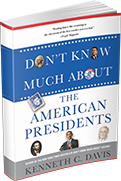
Don’t Know Much About® the American Presidents (Hyperion Paperback-April 15, 2014)
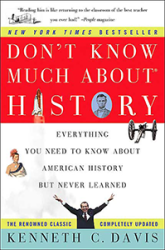
Don’t Know Much About® History: Anniversary Edition (Harper Perennial and Random House Audio)
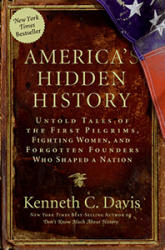
America’s Hidden History, includes tales of “Forgotten Founders”
June 23, 2014
Whatever Became Of…56 Signers? (One in a series)

The Grand Flag of the Union, the “first American flag,” originally raised in 1775 and later by George Washington in early 1776 in Boston. The Stars and Stripes did not become the “American flag” until June 14, 1777. (Author photo © Kenneth C. Davis)
…We mutually pledge to each other our Lives, our Fortunes , and our Sacred Honor.
Strong words that conclude the Declaration of Independence, adopted by the Continental Congress on July 4, 1776.
There is little question that men who signed that document were putting their lives at risk. The identity and fates of a handful of those signers is well-known. Two future presidents –Adams and Jefferson– and America’s most famous man, Benjamin Franklin, were on the Committee that drafted the document.
But the names and fortunes of many of the other signers, including the most visible, John Hancock, are more obscure. In the days leading up to Independence Day, I will offer a thumbnail sketch of each of the signers in alphabetical order. Some prospered and thrived; some did not: How many of those signers actually paid with their lives, fortunes and sacred honor?
-John Adams (Massachusetts) Aged 40 when he signed, he went on to become the first vice president and second president of the United States. Adams died on the 50th anniversary of the Declaration in 1826 at age 90. (Jefferson died that same day)
-Samuel Adams (Mass.) Older cousin to John, Samuel Adams was 53 at the signing. He went on to a career in state politics, initially refused to sign the Constitution because it lacked a Bill of Rights, and was governor of Massachusetts. He died in 1803 at 81.
-Josiah Bartlett (New Hampshire) Inspiring the name of the fictional president of West Wing fame on TV, Bartlett was a physician, aged 46 at the time of the signing. He helped ratify the Constitution in his home state, giving the document the necessary nine states to become the law of the land. Elected senator he chose to remain in New Hampshire as governor. Three of his sons and other descendants also became physicians. He died in 1795 at age 65.
-Carter Braxton (Virginia) A 39-year-old plantation owner, Braxton was looking to invest in the slave trade before the Revolution. Initially reluctant about independence, he helped fund the rebellion and lost a considerable fortune during the war –not because he was a signer, but because of shipping losses during the war itself. He later served in the Virginia legislature and died in 1797 at age 61, far less wealthy than he had been, but also far from impoverished.
-Charles Carroll of Carrollton (Maryland) A plantation owner, 38 years old and one of America’s wealthiest men at the signing, Carroll was the only Roman Catholic signer and the last signer to die. Owner of hundreds of slaves, Carroll considered freeing some of them before his death and later introduced a bill for gradual abolition in Maryland, which had no chance of passage. At age ninety-one, he laid the cornerstone of the Baltimore and Ohio Railroad as a member of its board of directors. He died in 1832 at age 95.
Longer biographical sketches of the Declaration’s signers can be found at this National Park Service site. And read more about the Declaration and the signers in:

DON’T KNOW MUCH ABOUT® THE AMERICAN PRESIDENTS (HYPERION PAPERBACK APRIL 15, 2014)

Don’t Know Much ABout® History: Anniversary Edition (Harper Perennial and Random House Audio)
June 16, 2014
Who Said It? (6/16/2014)
Abraham Lincoln, “House Divided Speech” before the Republican State Convention, Springfield, Illinois, (June 16, 1858)
Lincoln gave this speech after being nominated by the Republican party to challenge Democrat Stephen A. Douglas for a Senate seat from Illinois.
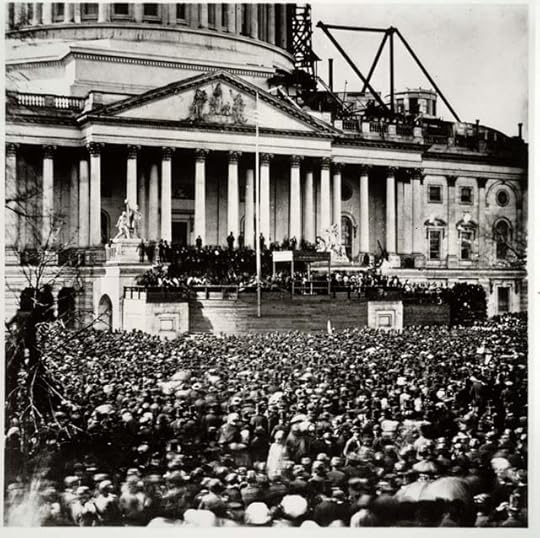
(This photograph depicts Lincoln’s inauguration in March 1861. Source: Library of Congress)
We are now far into the fifth year, since a policy was initiated, with the avowed object, and confident promise, of putting an end to slavery agitation.
Under the operation of that policy, that agitation has not only, not ceased, but has constantly augmented.
In my opinion, it will not cease, until a crisis shall have been reached, and passed.
“A house divided against itself cannot stand.”
I believe this government cannot endure, permanently half slave and half free.
I do not expect the Union to be dissolved – I do not expect the house to fall – but I do expect it will cease to be divided.
It will become all one thing or all the other.
Either the opponents of slavery, will arrest the further spread of it, and place it where the public mind shall rest in the belief that it is in the course of ultimate extinction; or its advocates will push it forward, till it shall become alike lawful in all the States,old as well as new – North as well as South.
Source and Complete text: Abraham Lincoln Online
Read more about Lincoln, his life and administration in these books:
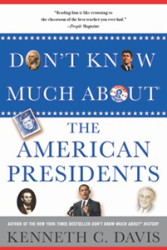
Don’t Know Much About® the American Presidents (Hyperion paperback-April 15, 2014)

Don’t Know Much About the Civil War (HarperPerennial Paperback/Random House Audio)

Don’t Know Much ABout® History: Anniversary Edition (Harper Perennial and Random House Audio)
June 13, 2014
Pop Quiz: What American institution was “born” on June 14, 1775?
June 14, 1775 is considered the birthday of the United States Army.
Reportedly, at John Adams’ request, Congress voted to “adopt” the Boston troops on June 14, although there is no written record of this decision. Also on this day, Congress resolved to form a committee “to bring in a draft of rules and regulations for the government of the Army,” and voted $2,000,000 to support the forces around Boston, and those at New York City. Moreover, Congress authorized the formation of ten companies of expert riflemen from Pennsylvania, Maryland, and Virginia, which were directed to march to Boston to support the New England militia.
George Washington received his appointment as commander-in-chief of the Continental Army the next day, and formally took command at Boston on July 3, 1775.
–John R. Maass, Historian
US Army Center of Military History
June 14 is also Flag Day, marking the day in 1777 when Congress authorized the “Stars and Stripes.”

Don’t Know Much ABout® History: Anniversary Edition (Harper Perennial and Random House Audio)

Don’t Know Much About® the American Presidents (Hyperion paperback-April 15, 2014)
June 12, 2014
Juneteenth- Time to celebrate
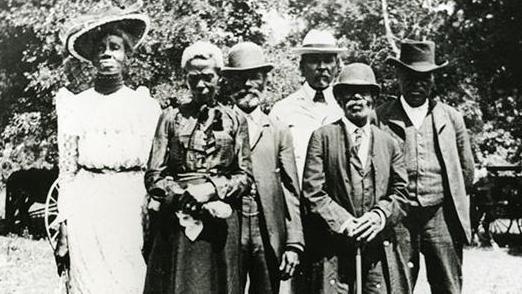
The official Juneteenth Committee in East Woods Park, Austin, Texas on June 19, 1900. (Courtesy Austin History Center, Austin Public Library)
Happy Juneteenth! Since 1865, June 19th has served as another kind of Independence Day. It is a day that celebrates the end of slavery in America.
On June 19, 1865, Union General Gordon Granger informed former slaves in the area from the Gulf of Mexico to Galveston, Texas that they were free. Abraham Lincoln had officially issued the Emancipation Proclamation on January 1, 1863, but it had taken two more years of Union victories to end the war in April 1865 and for this news to reach enslaved people in remote sections of the country.
This is from General Granger’s Order No. 3:
The people of Texas are informed that, in accordance with a proclamation from the Executive of the United States, all slaves are free. This involves an absolute equality of personal rights and rights of property between former masters and slaves, and the connection heretofore existing between them becomes that between employer and hired labor. The freedmen are advised to remain quietly at their present homes and work for wages. They are informed that they will not be allowed to collect at military posts and that they will not be supported in idleness either there or elsewhere.
Many of the newly freed slaves in the territory, the last area to receive news of the war’s end and Emancipation, celebrated the news with ecstasy, and according to the Texas State Library, the words “June” and “nineteenth” became a new word and a new celebration of freedom. They called it Juneteenth.
In many parts of Texas, ex-slaves purchased land, or “emancipation grounds,” for the Juneteenth gathering. Examples include: Emancipation Park in Houston, purchased in 1872; what is now Booker T. Washington Park in Mexia; and Emancipation park in East Austin.
Other former slaves began to travel to other states in search of family members who had been separated from them by slave sales. Starting in 1866, that spontaneous celebration –more commonly called “Juneteenth”– spread to become a holiday celebrating emancipation in many parts of the United States, although it still lacks national recognition. Read more about Juneteenth in the article Juneteenth: Our Other Independence Day , which I wrote for Smithsonian.com
June 10, 2014
Who Said It? (6/10/2014)
President Ronald Reagan, “Speech at the Brandenburg Gate,” (June 12, 1987)
As I looked out a moment ago from the Reichstag, that embodiment of German unity, I noticed words crudely spray-painted upon the wall, perhaps by a young Berliner, “This wall will fall. Beliefs become reality.” Yes, across Europe, this wall will fall. For it cannot withstand faith; it cannot withstand truth. The wall cannot withstand freedom.
Earlier in the same speech, Reagan said:
There is one sign the Soviets can make that would be unmistakable, that would advance dramatically the cause of freedom and peace. General Secretary Gorbachev, if you seek peace, if you seek prosperity for the Soviet Union and Eastern Europe, if you seek liberalization: Come here to this gate! Mr. Gorbachev, open this gate! Mr. Gorbachev, tear down this wall!
Source and full Text of Reagan’s speech: TeachingAmerican History.org
The New York Times offers an extensive archive on the Berlin Wall. The fall of the Wall, beginning on November 9, 1989, a little more than two years after Reagan’s speech, is considered the beginning of the end of communism in Europe.
Read more about the Cold War and Reagan’s life and presidency in Don’t Know Much About History and Don’t Know Much About the American Presidents.

Don’t Know Much About® the American Presidents (Hyperion paperback-April 15, 2014)

Don’t Know Much About® History: Anniversary Edition (Harper Perennial and Random House Audio)
June 4, 2014
Who Said It (6/4/2014)
President Franklin D. Roosevelt, “D-Day Prayer” in an announcement to the nation of the invasion of Normandy (June 6, 1944)

Franklin D. Roosevelt in 1933
They will be sore tried, by night and by day, without rest-until the victory is won. The darkness will be rent by noise and flame. Men’s souls will be shaken with the violences of war.
Franklin Roosevelt’s D-Day Prayer Source: Franklin D. Roosevelt Library and Museum
More D-Day resources can be found at the FDR Library and Museum
Read more about FDR’s life and administration and World War II in Don’t Know Much About® History and Don’t Know Much About® the American Presidents

Don’t Know Much About® the American Presidents (Hyperion paperback-April 15, 2014)

May 29, 2014
Pop Quiz: Has there been an Atheist President?
Most American Presidents have been Christians and most of them Protestants. Only one to date has been a Roman Catholic– John F. Kennedy. But three American presidents, while nominally Christians, claimed no formal religious affiliation.
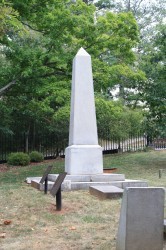
Thomas Jefferson’s Grave Marker at Monticello
Which three American Presidents had no formal religious affiliation?
This Pew Survey on Presidential Traits provides the answer.
The American public has never had an atheist president, although three of them have had no formal religious affiliation. The most recent one, Andrew Johnson, left office in 1869. Since then, every president has been affiliated with a Christian church. (Thomas Jefferson and Abraham Lincoln are the other two.)
The three presidents with no formal religious affiliation were Thomas Jefferson, Abraham Lincoln and Andrew Johnson. Jefferson was publicly accused of being an atheist by his political opponents such as Alexander Hamilton, who said Jefferson was “an atheist in religion and a fanatic in politics.” (David L. Holmes, The Faiths of the Founding Fathers, p. 81).
Jefferson once famously expressed his views on religious tolerance this way:
“It does me no injury for my neighbor to say there are twenty gods, or no god. It neither picks my pocket nor breaks my leg.”
I have written about America’s history of religious tolerance –and intolerance– previously in these articles:
“Jefferson, Madison, Newdow?” New York Times March 26, 2004
“America’s True History of Religious Tolerance,” Smithsonian October 2010
“Why US is Not a Christian Nation,” CNN.Com July 4, 2011.
Read more about these men in Don’t Know Much About the American Presidents.

Don’t Know Much About® the American Presidents (Hyperion paperback-April 15, 2014)
Who Said It? (5/28/2014)
President John F. Kennedy, Inaugural Address (January 20, 1961)
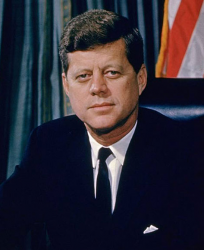
President John F. Kennedy (1961)
John F. Kennedy, the 35th President of the United States, was born on May 29, 1917.
We dare not forget today that we are the heirs of that first revolution. Let the word go forth from this time and place, to friend and foe alike, that the torch has been passed to a new generation of Americans–born in this century, tempered by war, disciplined by a hard and bitter peace, proud of our ancient heritage–and unwilling to witness or permit the slow undoing of those human rights to which this nation has always been committed, and to which we are committed today at home and around the world.
Source: Online by Gerhard Peters and John T. Woolley, The American Presidency Project. http://www.presidency.ucsb.edu/ws/?pi....
Read more about the life, times and administration of John F. Kennedy in Don’t Know Much About® the American Presidentsand Don’t Know Much About® History.

Don’t Know Much About® the American Presidents (Hyperion paperback-April 15, 2014)

May 25, 2014
War and Remembrance: Reflections on Museums, Memories and Memorial Day
War and Remembrance
But, in a larger sense, we can not dedicate, we can not consecrate, we can not hallow this ground. The brave men, living and dead, who struggled here, have consecrated it, far above our poor power to add or detract.
–Abraham Lincoln, Gettysburg Address
The souvenir is more than fifty years old. It is a wooden toy revolver. The legend stamped on the barrel reads, “JULY 1, 2, 3, 1863 Gettysburg, Pa.”

Toy wooden revolver from Gettysburg Battlefield-1963
(Author Photo)
I keep it nearby, on my desk—a reminder of what it felt like to be a nine-year-old boy standing for the first time in the fields at Gettysburg. I was certainly too young to understand what the war was about then and the details of what had happened in those fields and rock-strewn hills 100 years earlier. But I certainly was old enough to know that something special had happened there. I probably didn’t understand what Lincoln’s Gettysburg Address meant. But I felt in my young soul that I was on the ground he called “hallowed.”
The approach of another Memorial Day, as always, comes with thoughts of duty, honor, courage, sacrifice and loss. The holiday, the most somber date on the American national calendar, was born in the ashes of the Civil War as “Decoration Day,” when General John S. Logan –a-veteran of the Mexican and Civil Wars, a prominent Illinois politician and leader of the Grand Army of the Republic, a Union fraternal organization –called for May 30, 1868 as the day on which the graves of fallen Union soldiers would be decorated with fresh flowers.
“We should guard their graves with sacred vigilance. All that the consecrated wealth and taste of the Nation can add to their adornment and security is but a fitting tribute to the memory of her slain defenders. Let no wanton foot tread rudely on such hallowed grounds.”
General John S. Logan’s General Order Number 11 (May 5, 1868)
Pointedly, Logan’s order was seen as a day to honor those who died opposing the “rebellion.”
It was with that sense of war and remembrance of the Union war dead that families of Confederate soldiers were kept out of Arlington National Cemetery –a cemetery built on land confiscated during the war from Confederate General Robert E. Lee of Virginia. In response, Confederate states began to mark their own “Decoration” or Memorial Days.
In other words, marking loss in America has always brought controversy. These Memorial Day memories come as the new 9/11 Memorial and Museum is opened to the public. And again there is controversy in how the nation remembers its fallen.
Families of some victims of the tragedy at the Twin Towers have said they will not visit the site—neither Memorial nor Museum. For some, it is simply too painful. For others the objection is that the site has been transformed into another New York City tourist destination. The admission fees and sales of souvenirs at Museum Gift Shop have brought cries of profiteering from tragedy and commercialism.
I understand the grief and even the anger at the idea that this “hallowed ground” has becomes a place of commerce. But on the other hand, I wonder if some nine-year-old child, born after that terrible day in 2001, might not take home a souvenir from Ground Zero and understand that in that place, something extraordinary and eternal happened. History is more than a recitation of dates and battles. Maybe fifty years from now that child will also treasure that keepsake –as I treasure mine– as a terrible reminder of loss and that, as Lincoln said at Gettysburg, a little more than 150 years ago,
“That these dead shall not have died in vain.”
Here is a review of the newly opened 9/11 Museum in New York City.
I discussed Memorial Day’s history and traditions recently on the CBS This Morning Saturday (video clip.)

